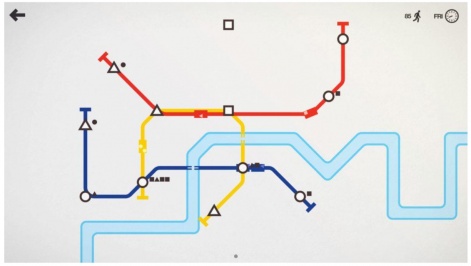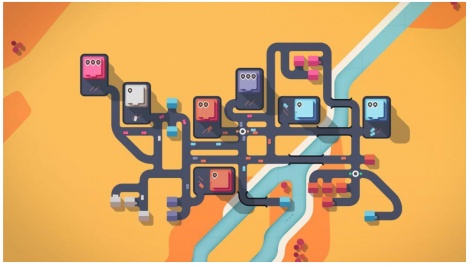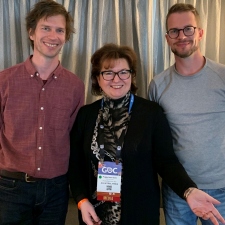Launching a new title in the current post-ATT mobile games market is tough, even for the world’s biggest companies. Casual and casino publisher Playtika has even temporarily outright suspended new game launches “until the ROI for new games is economically viable”.
And releasing a premium game? That business has long become increasingly challenging for all but the most notable developers, with only a deal via Apple Arcade really guaranteeing earnings.
And if you’re an indie, amidst all this upheaval and expensive barriers to marketing a game to the masses, the sector looks even more dicey.
Yet one indie developer, Dinosaur Polo Club, the creators of Mini Metro and Mini Motorways, has built its success on premium games. Despite industry turbulence the studio has now scaled its team to 24 staff while other tech and games companies are laying off employees.
So what's their secret?
Defying trends
The New Zealand-based studio was formed in 2013 by brothers Peter and Robert Curry, who have worked alongside one another at other companies too. “We've been living and working together for 39 out of 42 years,” says Robert during a chat at GDC 2023. “Oh shit,” his brother retorts…
The two co-founders entered the mobile games market without experience in mobile development and while they knew that, at that time, free-to-play had come to dominate the industry - a shift that publishing giants like Rovio and Zynga took significant time and investment to move to - Robert and Peter decided to defy convention on the big trend.
“We knew that free-to-play was the obvious thing to do,” explains Peter. “But I think we knew enough about that to know we couldn't do it well. I mean, the company we both used to work for, PikPok, thrived in that space. But we know they've got analytics and just all of these teams.”
Peter explains that the decision was made to go for premium on mobile and just “see what happens”. But against all odds, he says, it’s worked out.
“You could have looked at that in 2016 and thought, what are these people doing? It's ridiculous. At least, it did beat the odds in that space. But we really haven't looked back since.”

Premium success
It’s safe to say that their premium ‘gamble’ has paid dividends. To date, Mini Metro has sold as many as six million copies since it was first launched on Steam Early Access in 2014. It left Early Access in November 2015 before releasing on mobile a year later in October 2016. It’s also made its way to other platforms, such as Nintendo Switch and PlayStation 4.
While the title was launched on PC first, a long time ahead of the mobile version, the original focus had actually been on mobile, but the viability of Early Access led to a change in plans. That wasn’t the case for the follow-up, Mini Motorways, however. That title went straight to mobile in September 2019, becoming a launch title for subscription service Apple Arcade.
Premium on mobile is pretty much dead for most developers. And Apple Arcade was perhaps the final death knell for the business model, while conversely also updating it into a modern subscription service that arguably offers a lifeline for these experiences in a different setting. So what’s the catch for developers like Dinosaur Polo Club, who sign deals with Apple to release titles on the platform? Peter says the only restriction is they can’t be on any other mobile platform, such as Google Play.
“They don't mind us being on Steam, or Switch, or anything like that,” says Peter. “We're on both of those.”
Robert adds: “I guess from the outside, it can seem like Apple is this huge company, like, about 10,000 times the size of us, and can completely dictate our efforts. But it's actually an incredibly two-way relationship.”
Indie innovation
Dinosaur Polo Club has been an astute indie studio in building its premium success on mobile and across platforms, all while bucking industry trends and using tools like Early Access to its advantage. It’s almost surprising to think that the concept for Mini Metro, which has led to the studio’s huge success, was originally prototyped over just a few days and entered into the Ludum Dare 26 game jam.
Peter says that to differentiate as an indie and stand out in a crowded market, to find success as Mini Metro has, indies have to do things differently. Robert explains that to be a complete success, you must be “best in class”. One way to do this is to take an existing game, take inspiration and become the best in that genre, or, as Dinosaur Polo Club did, create your own class.
“I feel like that’s sort of where we got our success from,” he says. “We just kind of found ourselves in a space where it hadn't been explored that much. And so when we came out, we were the only game that really offered what we do.”

Offering advice for other indie developers, Peter says that, as an indie, innovation is, of course, important, but that developers don’t need to innovate on every single aspect of their game.
“There's no point in reinventing things if they already work and it's not what your game’s strength is,” he explains. “So just pick that one thing that you need to really innovate on to differentiate your game, and then for everything else, just pick whatever works.”
Robert adds that developers need to offer something players can’t get anywhere else, which is an indie’s keep strength.
“Make sure you nail that,” he states. “Everything needs other things around it. But your options interface doesn't need to be some amazing thing, it's just a menu. Just put a menu on. You don't need to reinvent the menu or how progression works. If progression is important to the core of this game, yes, you’ve got to innovate on that and make sure it works. But, otherwise, just pick something that works. You don't need to build it from the ground up. It doesn't need to be built brick-by-brick.”
Peter and Robert are coy on the studio’s next game, though they say they are “firmly committed” to the Mini franchise. The studio has found success by defying mobile industry trends so far while also leading the way in being part of the subscription service wave.
After growing the team to 24 developers, it’s hardly an indie studio anymore, but by diversifying across platforms and building a notable IP, the co-founders will hope it has built strong foundations for the next 10 years, which will undoubtedly see further market shakeups.






















